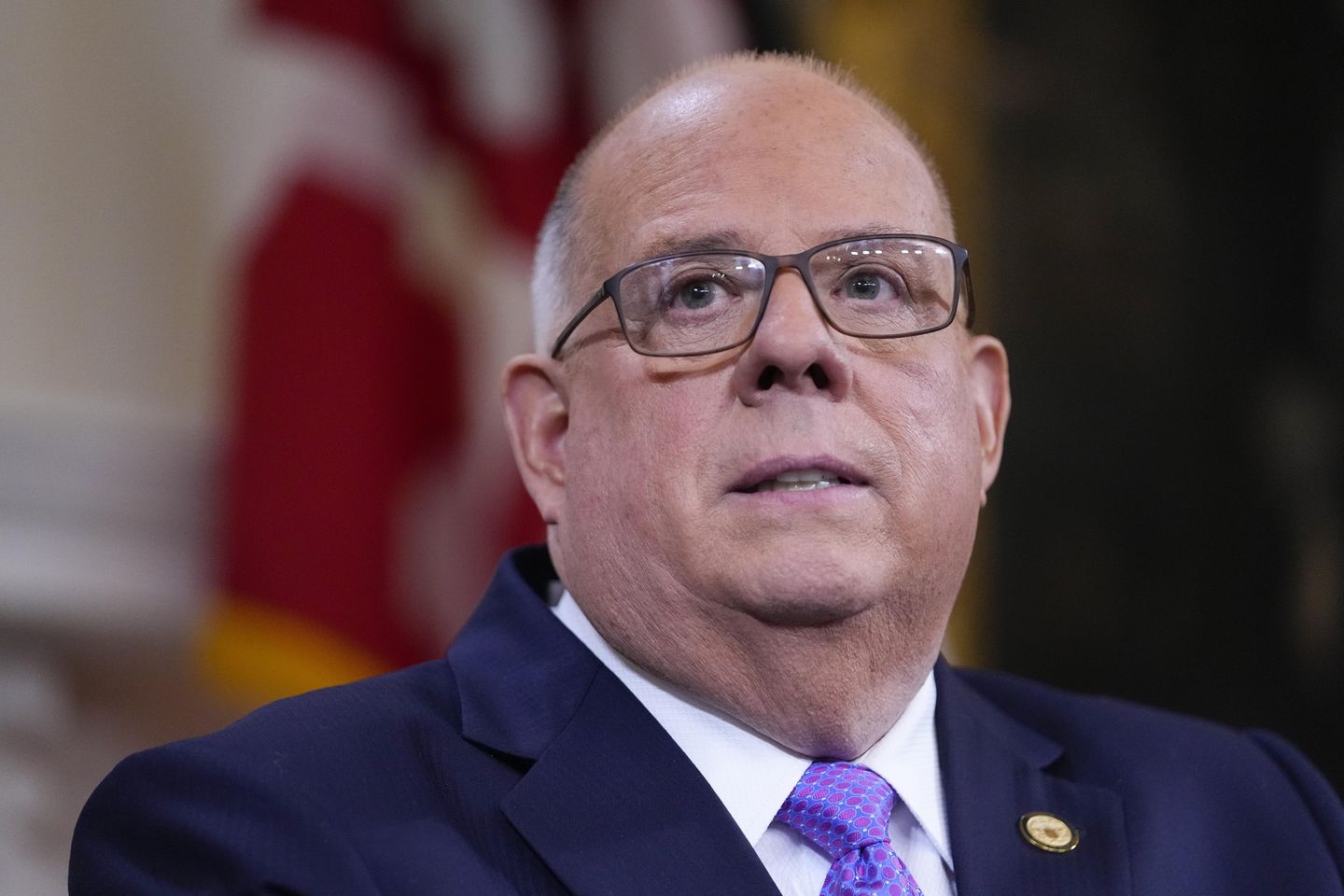
Larry Hogan is crisscrossing Maryland to reassemble the coalition of Republicans, independents and level-headed Democrats who twice sent him to the governor’s mansion in the deep-blue state.
Those voters are still winnable for him in his bid to be Maryland’s first Republican elected to the U.S. Senate since 1980, he told The Washington Times, including die-hard supporters of former President Donald Trump whom he has alienated with his open hostility toward the ex-president.
“When I stand up and say when I disagree with Trump, some people maybe bristle at that and wish that I would just fall in line on every single issue. But I’m never going to be like that,” Mr. Hogan told The Times in a wide-ranging interview. “But they also are very excited about the possibility of electing the first Republican in 44 years [as a] United States senator from Maryland.”
The Times joined Mr. Hogan in Ellicott City on Sunday as he made the final stops of his 10-day bus tour across the state.
Mr. Hogan’s late entry in the race earlier this year was Senate Democrats’ worst nightmare, instantly catapulting the contest to one of the most competitive in the nation to elect a replacement for retiring longtime Sen. Ben Cardin.
Mr. Hogan polls ahead of both Democratic candidates — Rep. David Trone and Prince George’s County Executive Angela Alsobrooks — and raised a hefty $3 million in the first two months of his campaign.
His tenure as governor overlapped when Mr. Trump was president, but this election will mark the first time that the two men will appear on the same ballot.
Mr. Hogan previously vowed not to vote for Mr. Trump for president this year.
He was greeted at a campaign stop Sunday by Trump supporter Reg Avery, who counts Mr. Hogan as a friend. Mr. Avery said he will vote for Mr. Trump and Mr. Hogan in November, stressing that he admires how Mr. Hogan distinguishes himself.
“He just seems to be a real honest guy who wants to do the right thing, and he’s not about the party,” Mr. Avery said. “I don’t see him as anti-Trump. I see him as the reality.”
Mr. Hogan remains one of the most popular politicians in the state, and he was more popular with Democrats than Republicans when he left office in January 2023.
Democrats are countering Mr. Hogan by warning he is the gateway to a Republican-controlled Senate that will be a threat to abortion access, expanded gun control laws and migrant rights.
Mr. Hogan wants voters to know that Republicans are on track to retake the Senate with or without him. That’s why voters — particularly Democrats and independents — should send him to Washington, he said.
“Republicans are going to be in charge of the Senate, whether [Democrats] like it or not,” Mr. Hogan said. “But I’m going to be the most common sense, reasonable guy that can work across the aisle to get things done, which is going to be more beneficial than just a freshman Democrat in the minority.”
Others share his assessment that the chamber will flip back to a Republican majority regardless of the Maryland election.
There are six other states, including Montana and Ohio, where Democrats must successfully defend endangered seats to maintain their one-seat majority. One of them, West Virginia, will certainly fall to Republicans with the retirement of Sen. Joe Manchin III.
Mr. Hogan is buoyed by astonishingly high job approval ratings from when he finished his second term as governor last year: 77% approval of Marylanders overall, including 81% among Democrats and 68% among Republicans.
Young Park, who was grocery shopping when Mr. Hogan made a campaign stop to speak with voters, was a microcosm for how the Republican has won statewide races in a state President Biden dominated by more than 30 percentage points. She and her husband were once registered Democrats but were convinced by Mr. Hogan to become Republicans.
Like much of the country, Ms. Park isn’t a fan of Mr. Biden or Mr. Trump. She and her husband are “still debating” whether they will support Mr. Trump but are certain it won’t be Mr. Biden.
For the Senate, Ms. Park said it’s a far easier decision.
“I think [Hogan] really has a good heart. That’s why I like him,” she said. “Because of him, we changed our minds to be Republican.”
Access to abortion, a galvanizing issue for Democrats in elections across the country, is also front and center in the Maryland race.
Mr. Trone said over the weekend that Mr. Hogan “doesn’t value reproductive freedom” and that the Republican “has a 45-year record of being anti-choice.”
Mr. Hogan said his position “has never changed.” He made clear his disapproval of a six-week ban like that taking effect in Florida but declined to stake out a position on what protections should be in federal law.
“I don’t think we’re going to have that legislation at the federal level,” Mr. Hogan said. “I don’t know what the reasonable restrictions are, but some of the things like the six-week ban in Florida is absolutely too restrictive and crazy and probably needs to be rolled back.”
If elected, Mr. Hogan’s first vote would be on a successor for Senate Republican leader Mitch McConnell, who will remain in office but no longer be party leader next year.
The two leading candidates — Minority Whip John Thune of South Dakota and Texas Sen. John Cornyn — are establishment figures close to Mr. McConnell and have endorsed Mr. Trump, though they have not been shy about criticizing Mr. Trump in the past. Mr. Hogan said both men would make fine leaders and did not dismiss a more conservative option like Florida Sen. Rick Scott, who has flirted with the idea and ran against Mr. McConnell last year.
“We don’t always agree on every single issue, but I think it’s great that there’s a competition,” he said.












